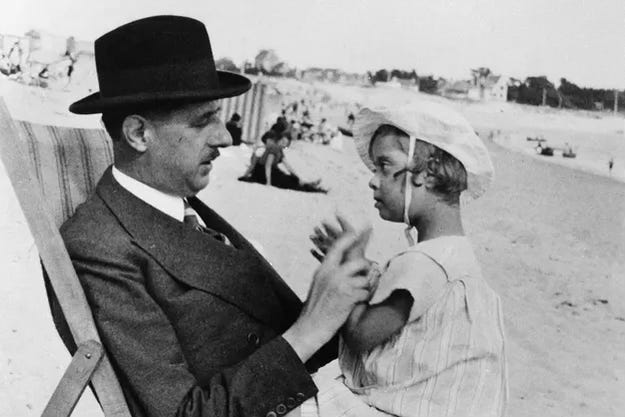A French Fan of America Rings the Alarm
What Claude Malhuret knows
“I adore the United States,” the French Senator Claude Malhuret told me recently over salad and a Coke Zero in Paris’s Café de Flore. The literary watering hole made famous by Jean-Paul Sartre and Simone de Beauvoir was packed with chic, would-be intellectuals imbibing glasses of wine or downing shots of expresso. “In France we do things because they have always been done this way. In America you do things because they have never been done this way.” Wherever he disembarks stateside, the size awes him. “In America, everything is large and it is possible; in France everything is small and it is impossible.”
Yet Monsieur Malhuret, a former longtime mayor of the French town of Vichy and a current member of the Senate party, Les Independents, had just given a passionate speech in the senate attacking President Trump’s administration as “Nero’s court,” complete with “an incendiary emperor, submissive courtiers, and a Ketamine-fueled buffoon [Elon Musk] charged with purging the civil service.” What is happening in America, he proclaimed, is not merely “an illiberal shift, it is the beginning of the confiscation of democracy.”
Malhuret said he was certain that in time America will respond appropriately: “I have confidence in the strength of American democracy.” Nevertheless, in short order “Trump has done more harm to the America than in four years of his last presidency. We were at war with a dictator [Vladimir Putin]; now we are fighting a dictator supported by a traitor [Trump].
Someone chanced on a video of Malhuret’s speech and translated it into “very good English,” thus distributing it on social media around the world. To date, only Bernie Sanders—“a perceived extremist who has recently become one of the sole sane voices in the US,” as Malhuret described him to me—has leveled comparably eloquent criticism of Trumpism. Malhuret meant to push European allies into re-arming in support of Ukraine rather than relying on its suddenly unpredictable ally in the United States. Still, the viral distribution of his speech raised in his mind a question: Why are so many American politicians, especially Democrats, so “timid?”
I wondered about Malhuret’s own motivation. Most of his senate speeches he described to me as “C’est normal.” Some others—about international topics such as Covid, the French “yellow-vest” protestors, the Ukraine—have gone viral. He sees nothing exceptional about most of them. But Malhuret’s audience seems drawn, as I was, to the deep humanity in his voice. Where does it come from?
In 1981, during Malhuret’s presidency of Doctors without Borders, an event reshaped his political temperament. His newlywed wife, the physician Christiane Malhuret, was delivering humanitarian aid to the African nation of Cameroon when her car flipped over. A United Nations medical aircraft arrived six hours later as she seemed to be taking her last breaths.
Tragically, scarring in her brain gave her a permanent disability, the Syndrome of Caravelleau, making it difficult for her to speak, to walk, and to use her hands. With his new wife 95 percent handicapped (according to official French measures), Malhuret made an unexpected life with her. Today, they have two adult daughters.
When I asked about Madame Malhuret, her husband extolled her spirits. “This is the most important thing in all handicaps,” he said. Most victims of cranial trauma fall into profound depression. But his wife kept extraordinarily good spirits. I could not help thinking that his loyalty had something to do with her emotional resilience. “She walks with a cane but she walks,” Malhuret said. “Perhaps tomorrow we will have to hire someone to take care of her 24/7”—Cavavelleau’s Syndrome is a deteriorating condition—”but today she does not need any of this.”
Malhuret is not the only French politician whose politics have been steeled by a family member’s disability. There is much talk in France these days of returning to the staunch French independence championed by Charles de Gaulle. But not everyone knows that that the handicap of de Gaulle’s daughter, Anne—born with a severe form of Down Syndrome in 1928—shaped him profoundly. “Without Anne, I would perhaps never have done what I did,” de Gaulle once declared to biographer Jean Lacouture. He doted on his youngest daughter until she died—at age 20—in his arms. Her life gave him strength to stand up to the Nazis, who collected and killed off persons like her, and by extension informed French resistance. After the Second World War, de Gaulle and his wife established the Anne De Gaulle Foundation to support the intellectually and developmentally handicapped. When he died in 1970, he was buried next to his beloved daughter.
“The comparison to Charles de Gaulle is unexpected,” says Claude Malhuret. “I have been more forged by my decades working in 3rd world countries than anything else, but I have also been forged by the handicap of my wife, it is true. He points out that the pathological depression—and ultimate suicide—of oldest daughter, Laurence, informed the sensibility of [Former President] Jacques Chirac as well. “Chirac’s sympathy for the weak in our society, his open heart, was due to his daughter,” commented a journalist, Pierre Hurel.
We need more politicians like Claude Malhuret. He is a man with a message for the world. Where are his American counterparts?



